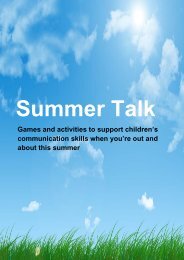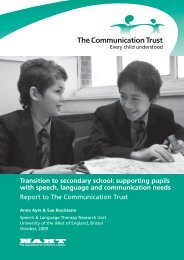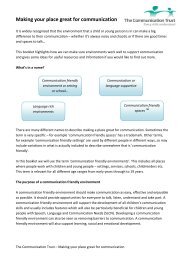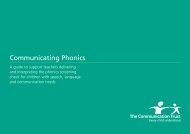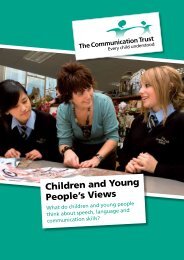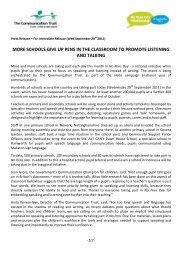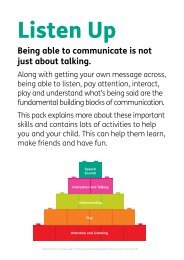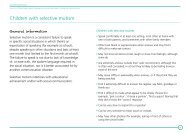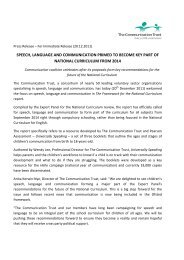A Generation Adrift - The Communication Trust
A Generation Adrift - The Communication Trust
A Generation Adrift - The Communication Trust
You also want an ePaper? Increase the reach of your titles
YUMPU automatically turns print PDFs into web optimized ePapers that Google loves.
Recent research<br />
concludes<br />
that teachers<br />
would benefit<br />
from more<br />
knowledge of<br />
children’s speech,<br />
language and<br />
communication<br />
development, as<br />
well as training<br />
in how to assess<br />
and measure<br />
these skills in<br />
young children<br />
appropriately.<br />
22 A <strong>Generation</strong> <strong>Adrift</strong><br />
Early intervention/prevention<br />
Knowledge of typical development<br />
and the component elements of<br />
language is crucial. Recent research<br />
concludes that teachers would<br />
benefit from more knowledge of<br />
children’s speech, language and<br />
communication development, as<br />
well as training in how to assess<br />
and measure these skills in young<br />
children appropriately. 95 <strong>The</strong> BCRP<br />
has identified a number of factors<br />
to consider in supporting early<br />
identification. <strong>The</strong> <strong>Communication</strong><br />
<strong>Trust</strong> has also produced a number<br />
of resources to support early<br />
identification for use in schools 96 ,<br />
which have been evidenced as<br />
being effective in reducing underidentification.<br />
97<br />
Case study<br />
Wallands County Primary<br />
School is a Shine a Light award<br />
winner with a dedicated<br />
speech and language unit. <strong>The</strong><br />
unit supports teachers to learn<br />
how to identify and support<br />
children with SLCN. Reception<br />
class children are assessed<br />
on entry, which highlights<br />
children who need further<br />
investigation by a speech and<br />
language therapist. Within the<br />
school, children with SLCN are<br />
prioritised for early intervention<br />
and specific programmes of<br />
support are given by dedicated<br />
specialist teaching assistants.<br />
Universal, targeted and<br />
specialist<br />
A graduated response is seen as<br />
being important to support children<br />
with SLCN; one which encompasses<br />
universal quality teaching, catchup<br />
programmes of support for<br />
children with delayed language,<br />
and more specialist support for<br />
those with more severe difficulties.<br />
For the best outcomes, this model<br />
would sit within a communication<br />
friendly environment and with the<br />
elements of leadership, workforce<br />
and parents embedded throughout.<br />
We have examples of models used<br />
to implement this approach 98 and<br />
through BCRP evidence of what<br />
interventions are most effective for<br />
children with SLCN across all levels of<br />
this graduated model. 99<br />
Case study<br />
<strong>The</strong> What Works website<br />
gives examples of a range<br />
of interventions that work<br />
across universal, targeted and<br />
specialist levels. A systematic<br />
framework for embedding<br />
these approaches alongside<br />
workforce development and<br />
strategic leadership, such as<br />
used in <strong>The</strong> <strong>Trust</strong>’s Talk of the<br />
Town programme, is key. For<br />
more information please go to<br />
www.thecommunicationtrust.<br />
org.uk/whatworks<br />
<strong>The</strong> importance of<br />
interventions<br />
<strong>The</strong>re is a growing number of<br />
evidenced interventions available to<br />
support children’s speech, language<br />
and communication. Interventions<br />
at all levels are absolutely essential<br />
to support children who can catch<br />
up to do so and those with longer<br />
term difficulties to communicate<br />
to the very best of their ability. <strong>The</strong><br />
BCRP highlights the importance<br />
of a personalised approach to<br />
teaching and learning, reflecting an<br />
understanding of a pupil’s language<br />
learning and literacy needs, social<br />
and communication difficulties and<br />
100 101<br />
academic progression.




